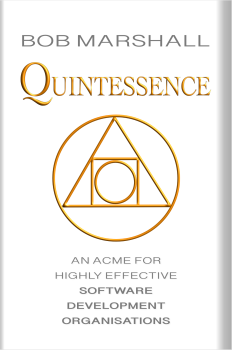Interactive Book: Quintessence – Chapter 17, Success
Sidecar for Chapter 17 of “Quintessence” (Success)
Selected ChatGPT Prompts
These 10 ChatGPT prompts will help you explore and understand the concept of Success in the context of the chapter “Quintessence”. The prompts are designed to cover different aspects of Success and offer insights into how quintessential organisations approach and define success. To use these prompts, simply input them into ChatGPT and feel free to customise them to suit your specific interests or questions.
- [Purpose] Define Success in the context of quintessential organisations.
[Prompt] How do quintessential organisations define success, and how does this definition differ from that of non-quintessential organisations? - [Purpose] Identify the Folks That Matter in quintessential organisations.
[Prompt] Who are the Folks That Matter in quintessential organisations, and how does their inclusion contribute to the organisation’s success? - [Purpose] Understand the role of personal success in quintessential organisations.
[Prompt] How does personal success relate to overall organisational success in quintessential organisations, and what is its significance? - [Purpose] Explore the concept of operational definitions of success.
[Prompt] What is an operational definition of success, and how do quintessential organisations use it to measure their progress? - [Purpose] Examine the Three Horizons model and its application to success.
[Prompt] Describe the Three Horizons model and explain how quintessential organisations use it to balance short, medium, and long-term success. - [Purpose] Understand how quintessential organisations balance different time horizons for success.
[Prompt] How do quintessential organisations balance success across various time horizons, and what strategies do they employ to achieve this? - [Purpose] Discuss the importance of meeting the needs of all Folks That Matter.
[Prompt] Why is it important for quintessential organisations to meet the needs of all Folks That Matter, and how does this approach contribute to their success? - [Purpose] Investigate the relationship between effectiveness and success in quintessential organisations.
[Prompt] How does increasing effectiveness contribute to the upward slope of success in quintessential organisations? - [Purpose] Analyse the role of the Core Group in non-quintessential organisations.
[Prompt] What is the Core Group in non-quintessential organisations, and how does their role in defining success contrast with that in quintessential organisations? - [Purpose] Explore the concept of success as a sliding scale.
[Prompt] Explain how success can be viewed as a sliding scale in organisations, and discuss the implications of this perspective for evaluating organisational performance.
- Defining Success.
[Prompt] Define Success in the context of quintessential organisations and discuss how it differs from non-quintessential organisations
[Exercise] Reflect on your organisation’s current definition of success. Evaluate whether it aligns with the principles of a quintessential organisation and identify areas for improvement. - The Role of Folks That Matter.
[Prompt] Describe the role of the Folks That Matter in quintessential organisations and their influence on the organisation’s success.
[Exercise] List the different constituencies within your organisation and assess how their needs are being met. Develop an action plan to address any unmet needs for these Folks That Matter. - Balancing Personal and Organisational Success.
[Prompt] Explain the relationship between personal success and organisational success in quintessential organisations.
[Exercise] Identify instances in your organisation where personal success may be prioritised over organisational success. Brainstorm ways to encourage a more balanced approach that supports both individual and collective achievements. - Operational Definitions of Success.
[Prompt] Discuss the concept of operational definitions of success and their significance in quintessential organisations.
[Exercise] Analyse your organisation’s current approach to measuring success. Propose a new or refined operational definition of success that aligns with quintessential organisation principles. - The Three Horizons Model for Success.
[Prompt] Explore the Three Horizons model and explain its relevance to balancing success in different time frames for quintessential organisations.
[Exercise] Assess your organisation’s current planning and goals in relation to the Three Horizons model. Identify any imbalances and suggest strategies to better align short, medium, and long-term success.
This learning path offers a structured approach to exploring the topic of Success in the context of quintessential organisations. By engaging with these prompts and exercises, you will gain valuable insights and develop practical strategies for fostering success in your own organisation.
Some Alternative Learning Paths
There are numerous learning paths that can be useful in the context of Success, depending on the specific aspects you want to focus on. Here are 10 potential learning paths to consider:
- Effective Communication: Learning how to communicate effectively with team members, stakeholders, and other Folks That Matter.
- Leadership and Management: Developing strong leadership and management skills to guide an organisation towards success.
- Goal Setting and Prioritisation: Establishing clear objectives and learning how to prioritise tasks and initiatives to achieve success.
- Team Building and Collaboration: Fostering a collaborative and cohesive work environment that supports shared success.
- Continuous Improvement: Understanding and implementing continuous improvement methodologies to drive organisational success.
- Change Management: Navigating and managing organisational change to achieve long-term success.
- Innovation and Creativity: Cultivating a culture of innovation and creativity to stay ahead in a competitive landscape.
- Emotional Intelligence: Developing emotional intelligence to better understand and manage relationships within an organisation.
- Conflict Resolution and Negotiation: Learning to resolve conflicts and negotiate effectively to maintain harmonious relationships and ensure collective success.
- Time Management and Productivity: Enhancing personal and organisational productivity by managing time and resources effectively.
These learning paths provide a diverse range of topics that can contribute to organisational success. They can be explored individually or in combination, depending on your organisation’s unique needs and priorities. Ask ChatGPT to elaborate on one or more of these paths, or suggest others.

